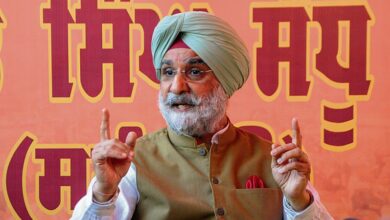Most climate issues are resolved by G20 ministers, according to Bhupendar Yadav
The G20 climate ministers’ conference in Chennai on Friday, according to environment minister Bhupendar Yadav, was a success, with the nations reaching consensus on 64 of 68 subjects.
The report of the conference provided by the chair, however, underlined the absence of international agreement on critical topics that are essential for keeping global warming to 1.5 degrees Celsius, including as the continued phase-out of fossil fuels, the expansion of renewable energy, and the provision of low-cost finance for poor nations.
The gathering comes after the bloc, which accounts for 80% of global emissions and 85% of the world’s GDP, failed to agree at the Energy Ministerial Meeting in Goa last week on how to finance the transition as well as how to triple renewable energy capacity to 11,000 gigawatts by 2030.
The bloc discussed accelerating the scaling up of renewable energy, tripling the capacity of renewable energy, phase-down of unabated fossil fuels, doubling the global rate of improvement of energy efficiency, scaling up of already available low and zero emission technologies, carbon removal and abatement technologies, and access to low-cost financing for developing countries, according to the chair’s summary, which lists the issues that lacked agreement.
Yadav stated during a news conference that the discussion was successful and that the ministers are committed to building a sustainable and resilient future.
The G20’s developing nations stressed the need for affluent nations to reach net-zero emissions by the year 2040, using historical cumulative emissions as a yardstick of accountability. However, there remained a definite gap on this topic between industrialized and developing nations.
Some participants emphasized the need of a worldwide peak in emissions no later than 2025 and a 60 percent decrease in emissions above 2019 levels by 2035.
According to a representative who was present at the conference in Chennai, “there is a clear cut divide between developed and developing countries on these issues, and it was no different here.”
Developing nations contend that the concepts of justice and Common but Differentiated Responsibilities and Respective Capabilities (CBDR-RC) must guide any action taken to mitigate climate change.
Equity simply implies that each nation’s contribution of world population and carbon dioxide emissions is equal. The CBDR-RC concept acknowledges that each nation must do its part to combat climate change, but developed nations should take the lead since they are primarily responsible for the majority of past and present greenhouse gas emissions.
Dr. Al Jaber, the president-designate of COP28, had asked G20 countries to set an example and show unity on climate action on Friday. He expressed worry that the COP28 promises, such as lowering energy use and doubling the capacity of renewable energy sources, had yet to be reflected in G20 results.
“Despite the Indian G20 Presidency’s work to achieve ambitious outcomes across both the G20 Energy Ministerial and Environment and Climate Ministerial, the text indicated that negotiations were mired in differences, with countries failing to rise above politics,” said Madhura Joshi of the global climate policy think tank E3G.
Ministers emphasize how important it is to employ the most up-to-date scientific knowledge in order to take effective climate action, but the results, particularly in the area of energy, are far from satisfactory. By spearheading the Leaders’ conference in September to course-correct climate action and promising to – tripling renewables by 2030 to over 11,000GW, double the pace of energy efficiency, and phasing out fossil fuels – India has the chance to drive the new engine of the global economy. According to research, doing this is challenging but doable, and it’s essential to keeping 1.5 alive, she added.
During the Climate and Sustainability summit, Aarti Khosla, Director of Climate Trends, a non-governmental environmental think tank, voiced displeasure with the lack of political will from a number of nations. The G20 countries need to dramatically increase their objectives to properly combat climate change, she added, as the globe gets ready for the Global Stocktake.
No common communiqué has yet been produced after any of the meetings on foreign policy, finance, energy, and climate change since India acquired the G-20 leadership in December.
But it’s probable that the declarations made at these conferences will be included into a final report that will be made public at the leaders’ summit set for September.
The increase in CO2 emitted into the atmosphere since the beginning of the industrial revolution is strongly related to the 1.15 degrees Celsius rise in Earth’s average surface temperature from the pre-industrial period (1850–1900).
Reports indicate that significant harm had already been done before the 1990s, when countries like India began to grow.
With China establishing a fresh new national temperature record of 52.2°C, Antarctica sea ice remaining at record low levels despite extraordinary winter weather, and Africa witnessing its warmest night ever, many countries are struggling with excessive heat.
There are terrible floods in other areas. In India, floods have claimed the lives of over 100 people, while floods in South Korea have claimed at least 12 lives.
Three countries accounted for more than half of global CO2 emissions in 2021, according to the “Global Carbon Budget Report – 2022”: China (31%), the US (14%), and the European Union (8%).
India, which came in fourth place, was responsible for 7% of the world’s CO2 emissions.
According to a United Nations Environment Programme study published last year, India’s per capita greenhouse gas output is just 2.4 tCO2e (tonne carbon dioxide equivalent), which is far less than the 6.3 tCO2e worldwide average.
The United States has much higher per capita emissions than the rest of the world (14 tCO2e), which is followed by Russia (13 tCO2e), China (9.7 tCO2e), Brazil and Indonesia (about 7.5 tCO2e each), and the European Union (7.2 tCO2e).







